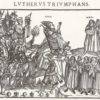Category: Evangelical Calvinist
Writings from the blog: Athanasian Reformed (aka The Evangelical Calvinist). Senior Reformed scholars present a coherent and impassioned articulation of Calvinism for today’s world.
Self-Justification as the Warp and Woof of Edenic Ejaculation
The notion of ‘being justified’ is an inherently Christian notion, at least in the West (but I’d argue, globally). Our grammars for thinking life, the secular/sacred divide is no matter, come to all of us through a Christian lens. But even prior to that, in a chronological (and logical) sense, the desire to be ‘justified,’ one way or the other, presupposes someone we are seeking to be justified before, even if that someone reduces to ourselves. Nonetheless, I find this ethos, this pathos even, to be rather stunning when paused upon for reflection. Eberhard Juengal writes: Wanting to justify yourself…
The Lutheran Connection with TF Torrance: The Kerygmatic Christ as the Concentration
The Gospels of the New Testament witness all present Jesus via His historicity, and the facts of His life as they unfolded in particular frames of reference. John the evangelist ended his Gospel with the quip, “And there are also many other things that Jesus did, which if they were written one by one, I suppose that even the world itself could not contain the books that would be written. Amen.” Clearly, Jesus was a historical personage, but this is not how the Christian has come to know Him at a first order; nor is it the way that the Evangelists…
What Hath Christology to do with Politics and the State?
What is the relationship between politics and Christian theology, is there any? Understandably, many Christians want to simply shy away, and have nothing to do with the political order in the world. But the fact of being human entails that we are “political animals,” that we are necessarily social beings, and as such, we cannot escape the reality of being political in some way. Indeed, the kerygma, the Gospel reality Hisself, which of course is God become flesh in the vicarious humanity of Jesus Christ, is the greatest political act of all time. This was not absent from the early…
Transitioning from a ‘Substance’ to a ‘Personal’ God: Confronting the Substance-Abusers
There is a lot of talk about ‘substance theology’ these days, and in the past days. Indeed, substance language marks classical theism as the way to talk God at least since the days of Thomas [of Aquino], if not further back since the Greeks started using the language of ousia or ‘being’ for talking God (but that was a little different from the Thomist heritage in the sense that they often used ousia as synonymous with hypostases or ‘persons’ and vice versa). No matter what period past to think and talk God in terms of substance has become considered the…
So What?! What Does All This Jargony Theology Have to do with Real Life?: A Personal Sketch
So what? What’s all this high falutin theologically jargony theology have to do with anything? I get to this point more times than not. Even though I often engage high theological notions, and attempt to reflect therein, at the end of it I often walk away with the “so what!” feeling. Many Christians take one look at the themes I write on, others write on, that the dead theologians have written on, and simply shake their heads figuring, at best, this is all for the eggheads among us. But I really don’t think that that is the case, or that…
The PhD Saga
My PhD saga continues. I am no longer a PhD student, at least for now. For a variety of life circumstances (none bad) it isn’t going to work out at the moment. Circumstances change, and life has its ebb and flows. When things do finally ebb the right direction, hopefully, the PhD will finally materialize; somehow, someway, somewhere. I am forever honored by Martin Luther School of Bible and Theology and Concordia Academic Theology Consortium for awarding me with the honorary doctorate of theology (ThD). That was a highly meaningful gesture, and acknowledgement of the work I have been able…
A Christologically Conditioned Theanthropology Revealed at the Cross
The theology of the cross reveals that God isn’t a philosophical Monad, or some pure being up yonder. The theology of the cross reveals that God in Christ is humble enough to define His being by concretely becoming flesh and blood humanity, such that we might share with Him who He has always already freely chosen to be: God not without us, but with us (Immanuel), in and by the assumed and vicarious humanity of Jesus Christ. And yet, His being, even in His humiliation as a human, becomes the image within which we are created and recreated, just as…
Martin Luther Against Aristotle’s Nicomachean Ethics and the Post Reformed orthodox
Martin Luther, as I have referred to previously, was indeed anti-Aristotelian, particularly with reference to Aristotle’s anthropology as that effused throughout his Nicomachean Ethics. Indeed, Luther makes his disgust toward Aristotle’s Ethics, and thus, anthropology, very clear in his theological protestations, as he nailed those, just a month prior to his 95 theses, to the Wittenberg door. This was the real reason for Luther’s reformation, as my former professor and mentor, Dr Ron Frost, has so clearly argued. Luther saw Pelagian wickedness in Aristotle’s anthropology, and of course insofar as Aquinas appropriated Aristotle’s Ethics, among other things, this compelled Luther…
Jesus as Demi-Urge in the classical Calvinist Schemata
What is it about the decretum absolutum (absolute decree i.e., predestination in determinist mode) that sinks the classical Calvinist understanding of a doctrine of God in a God-world relation? It’s that it operates from an instrumentalist understanding of the Son’s relationship to the Father; it ruptures the eternal bond between the Father to the Son by the Spirit as the Son incarnates and becomes human. Under such conditions the work of Jesus is no longer essential to the being of the Son (and thus the Father), as such He simply becomes so much a demi-urge carrying out the dictates of…
Some Rationales on the PhD of Choice
One thing that gave me the final push to pursue the PhD where I am is seeing where the PhD in theology leads, even from prestigious schools. I cannot justify going into exorbitant amount of debt (which I already have from undergrad and seminary) to earn a degree even from a prestigious school with so-called “funding” (and most UK schools don’t even have that) that will not finally result in landing a career that 1) fits naturally with the focus of the degree (like being a full time prof), and 2) doesn’t provide a job that will pay enough to…









